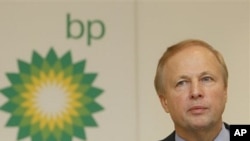World oil prices rose sharply on Monday as violence in Libya sparked worries that energy supplies could be disrupted. The price of Brent crude oil in London, the benchmark for much of the world, jumped more than two percent to hit its highest price since 2008. The unrest prompted some major oil companies to start pulling their workers out of Libya as clashes between protesters and government security forces escalate.
Britain-based BP says it has stopped its onshore drilling preparations in Libya and is evacuating its expatriate staff along with their dependents.
Speaking on Monday, BP’s chief executive Bob Dudley said the company is closely watching how events progress.
“We have operations there that are very, very limited, it’s the early stages of exploration," he said. "We have some people there. Dependants have left the country. We remain committed to doing business there but again we, like everyone, is watching this very carefully."
BP is not the only major oil firm reacting to rising unrest in the North African country. Shell has relocated the dependents of expatriate staff and Norwegian Statoil has closed its office in the capital Tripoli.
The moves came as unrest in Libya escalated on Monday, spreading to the capital Tripoli. According to the international campaign group Human Rights Watch over 200 people have died since last Thursday.
The unrest follows major revolts in Tunisia and Egypt, which toppled both countries’ longtime rulers.
David Wech, an analyst with the Vienna based energy consultancy JBC Energy, says the situation in Libya has a much more significant impact on the oil market than other revolts in the region.
"I mean it's definitely more important than what's happened in Tunisia," said Wech. "Egypt was of relevance as well in terms of a transit country but in terms of oil production it's clearly Libya that's most important."
Libya is the world’s twelfth largest oil exporter. According to the International Energy Agency it produces around 1.6 million barrels of crude a day, around 2% of global oil demand.
Lech says the long term effects of the current situation shouldn’t be major.
But Christopher Davidson from Britain’s Durham University, says oil may have a major impact on the domestic political situation in Libya.
On Monday, one of leader Moammar Gadhafi's sons addressed the nation and warned that civil war could result in Libya’s oil being burned by “thugs, criminals, gangs, and tribes.”
Davidson says the departure of the oil companies is bad news for Libya’s leadership.
"It's not particularly bad news for the opposition. I think the opposition see this as necessary and inevitable," said Davidson. "They have to have Libya purged really of any companies or influences that have sided and propped up Gadhafi. However I'm sure any new democratic administration in Libya will be quite realistic and will know it has to bring back the multinational concessions because Libya needs a technology transfer."
BP signed an oil deal with Libya in 2007 worth at least $900 million.
Oil Firms Pull Workers Out of Libya
